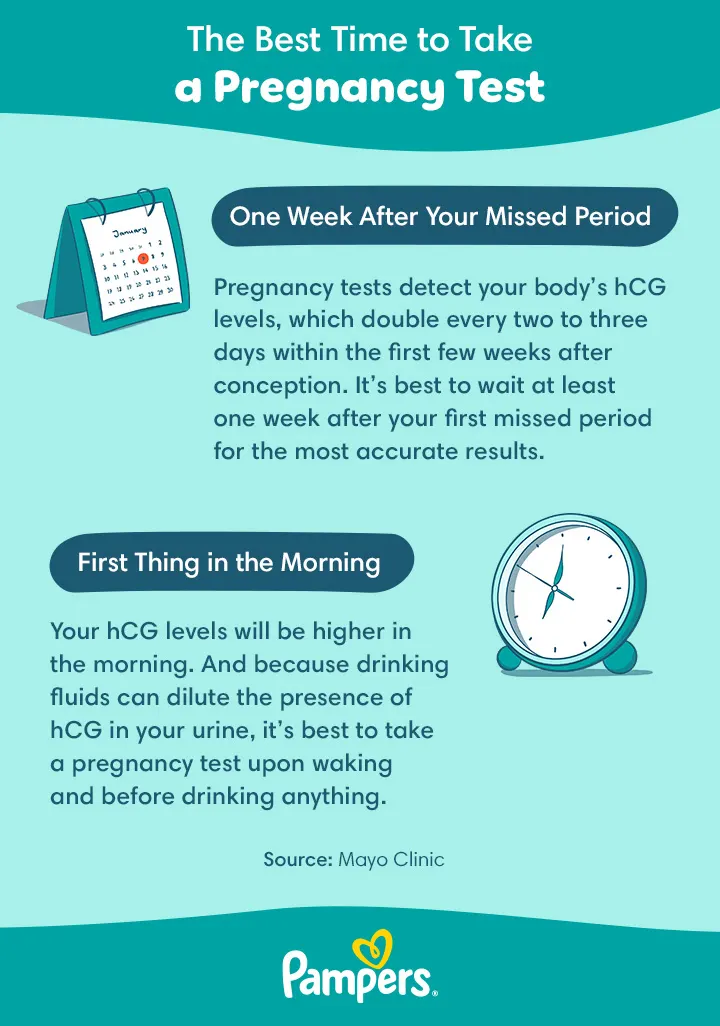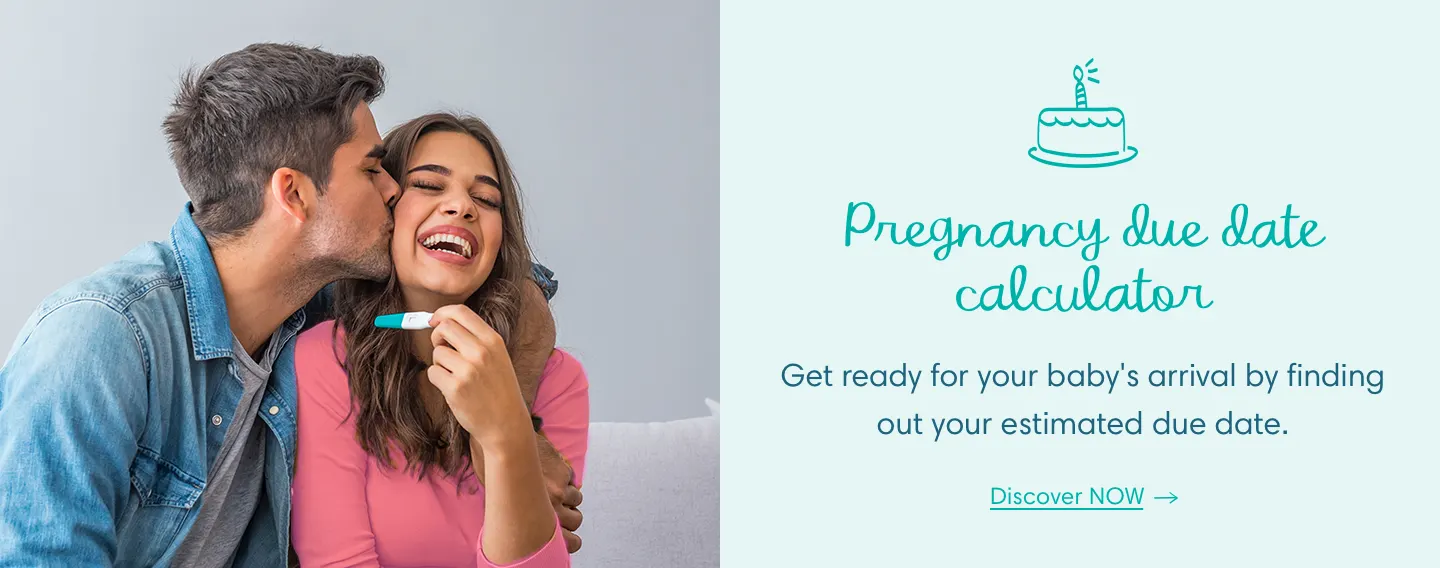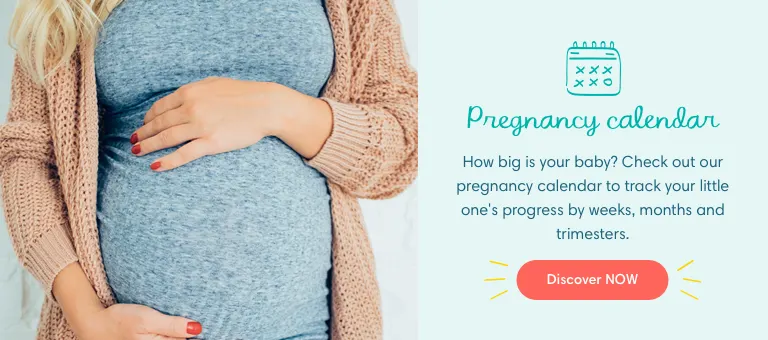Pregnancy Tests Explained: Timing, Accuracy, and Types
Have you missed a period or noticed any other signs of pregnancy? Then perhaps you’re wondering whether to test for pregnancy and when! Learn all about when to take a test, how home pregnancy tests work, and how accurate and reliable they are. Plus, discover how soon you can take a pregnancy test, how to read one, and more.
What Is a Pregnancy Test
A pregnancy test is a diagnostic tool used to detect human chorionic gonadotropin (hCG)—a hormone produced by the placenta during pregnancy—in a person’s urine or blood. These tests are designed to confirm whether you’re pregnant or not. If your test is positive, this generally means you’re pregnant, and if the test is negative, you may not be pregnant.
So, what does a positive pregnancy test look like? A positive home pregnancy test typically displays two distinct lines or a plus sign (+) in the result window, depending on the brand and type of test used. It’s important to read the instructions on the test kit you intend to use.
How Soon Can You Take a Pregnancy Test?
So if you suspect you might be pregnant, when is the best time to test for pregnancy and how soon can pregnancy be detected? The best time to take a pregnancy test is a week after your missed period. This time is when the results will be more accurate. If you’re wondering how soon or how early you can take a pregnancy test, you’re not alone—it’s common to want those results as soon as possible. You can take a test earlier than we mentioned above, but it’s better to wait until after your first missed period, as you might not be producing enough hCG before then.
But, can you take a pregnancy test while on your period? And how long after sex can you take a pregnancy test? Again, these are common questions, but remember that your body only produces hCG after the fertilized egg implants itself in the lining of your uterus and the placenta starts to form, which might cause some light implantation bleeding. Your hCG levels will double every two to three days during the first few weeks of pregnancy, which is why it’s a good idea to wait to take a pregnancy test.
In the meantime, if you’re wondering whether you’re pregnant or not, you might want to look out for some early signs of pregnancy, which may include
tender, swollen breasts
When Is the Best Time to Take a Pregnancy Test?
We mentioned above that the best time to take a pregnancy test is a week after your first missed period, but does the time of the day matter? Potentially yes! First thing in the morning is usually considered the best time as this is when hCG levels are more concentrated.
How Do Pregnancy Tests Work?
Pregnancy tests work by detecting a hormone known as hCG (human chorionic gonadotropin). Often called the “pregnancy hormone,” hCG is produced by the developing placenta after a fertilized egg implants in the uterus lining following conception.
Your body will continue to produce hCG at very high levels in the first three to four months of pregnancy. It signals your body to sustain the pregnancy and can be detected by pregnancy tests in your urine and blood.
How Long Does It Take to Get the Results of a Pregnancy Test?
If you take an at-home pregnancy test you will usually get the results within a few minutes—meaning you don’t have to wait too long for the big news. But all tests are different so it’s important to read and follow the instructions carefully. On average, home pregnancy tests take around 3 minutes.
It’s also important to read your result within the specified timeframe because the results may be inaccurate if you wait too long.
What Types of Pregnancy Tests Are There?
Two types of pregnancy tests can detect the presence of hCG: urine tests and blood tests. The typical at-home pregnancy test you can get at the drugstore tests your urine, whereas a healthcare provider must conduct a blood test.
A Urine Pregnancy Test
A home pregnancy test uses your urine to detect hCG. If you’re wondering where to buy pregnancy tests like these, you can get one at any drugstore, grocery store, or community clinic, or from your healthcare provider. Once you have one, your next question might be how to use a pregnancy test. The process for taking a urine test to check for pregnancy is pretty straightforward; here’s what to do:
Read the instructions. Different home pregnancy test brands may have slightly different directions. For example, how long to pee or how long to wait for results may vary from brand to brand.
Remove the stick (and cup) from the packaging. What does a pregnancy test look like? Home pregnancy tests come in stick form. With some, you’ll pee directly onto the end of the stick, whereas with others, you’ll dip the stick into a small cup of your urine.
Pee. Depending on the instructions, you’ll pee directly on the stick—a prepared chemical strip—or dip it into a urine cup.
Wait. All home pregnancy tests work by detecting hCG in your urine, but the instructions and wait times will vary among brands. Some brands are more sensitive than others.
Read the results. Classic tests reveal the news with signs and lines. A plus sign or two lines usually indicates a positive pregnancy test. Digital pregnancy tests spell out the news with words like “pregnant” if positive or “not pregnant” if negative.
You can take a urine pregnancy test in your healthcare provider’s office or at home. In the office setting, the provider can ensure a correctly performed test and give you the results.
A Pregnancy Blood Test
Only a healthcare provider or clinician can perform a pregnancy blood test. A blood test won’t offer an immediate result like with a urine test—it can take from a few hours to more than a day—but it’s more sensitive and accurate.
A common question is how soon or how early you can take a pregnancy test. One perk about pregnancy blood tests is that they work during early pregnancy. So, how early will a blood test detect pregnancy after conception? They work as early as 9 to 12 days after conceiving!
There are two types of pregnancy blood tests:
Quantitative blood test. Also known as a beta hCG test, this test measures the exact amount of hCG in your blood.
Qualitative test. This test indicates if the hormone is present in the blood or not.
What pregnancy test is the most accurate? Both types of pregnancy blood tests can indicate pregnancy early and more accurately than at-home urine tests.
How Accurate and Reliable Are Home Pregnancy Tests?
It’s natural to wonder if your results are accurate, especially when anticipating something so important. Many parents ask, “How accurate are home pregnancy tests?” and “Can pregnancy tests be wrong?” Most at-home pregnancy tests claim to have an accuracy rate of 99 percent; however, the result you receive can depend on various factors, such as:
When you take the test. Do you have to take a pregnancy test in the morning? The best time to take a pregnancy test is first thing in the morning when hCG levels are more concentrated. It’s also a good idea to wait until one week after your missed period before testing, when a home pregnancy test is most accurate.
The expiration date of your test. Do pregnancy tests expire? Yes, they do! Make sure your test is not past its expiration date, as this can affect the accuracy of the results.
Your fluid intake. Did you know that drinking too much water before taking the test can dilute the hCG levels in your urine? That’s another reason why it’s best to take a test upon waking up and before drinking any fluids.
How you perform the test. It’s important to follow the test instructions precisely, as this can also affect the results you get.
The brand of the test. Some brands will be more sensitive than others.
If you’re taking medications with hCG in them. Although most medications won’t affect a home pregnancy test, taking fertility drugs with hCG can impact your results.
Can You Get a False-Negative Result?
Yes, it’s possible to get a false-negative result on your pregnancy test when you are actually pregnant. What can cause a false-negative pregnancy test? False negatives typically occur if:
you take the test too soon (before one week after your missed period)
your urine is too diluted from drinking liquids
you don’t wait long enough for the results.
That last point begs the question how soon will a pregnancy test read positive or negative? Depending on the test and its instructions, you may need to wait as long as 10 minutes to get the most accurate result. Follow the instructions on your test closely and give the test time to work. If you’re feeling anxious or excited, you may even want to set a timer and find a distraction, so you don’t look too soon!
Can You Get a False-Positive Result?
It’s possible to get a false-positive result on a home pregnancy test, meaning that the test shows you’re pregnant when you’re not. This outcome is rare, however. What can cause a false-positive pregnancy test? You could get this result if you’re taking a fertility drug containing hCG, for example, or if you simply take the test incorrectly.
What to Do and Not to Do Before Taking a Pregnancy Test
These tips can help ensure that your testing goes smoothly, and that you get the most accurate results from your pregnancy test.
What to Do Before Taking a Pregnancy Test:
Check the expiration date. Ensure the pregnancy test is not expired for accurate results.
Read instructions carefully. Follow the test’s instructions precisely to ensure accurate results.
Choose the right time. Take the test in the morning when your urine is more concentrated for best results.
Store properly. Store the test in a dry place and away from direct sunlight if you don’t plan on using it straight away.
Check sensitivity. Choose a test sensitive enough to detect early pregnancy if you’re testing before a missed period.
Plan ahead. Have a timer or watch ready to time the test accurately.
What Not to Do Before Taking a Pregnancy Test:
Drink excessive fluids. Drinking too much before the test may dilute your urine, potentially affecting results.
Take medications that might interfere. A common question is, “Can medications change the result of my pregnancy test?” Fertility medication containing hCG is generally the only medication that may affect the result of a pregnancy test. Consult with a healthcare provider if you’re concerned about any medications you’re taking.
Use expired tests. Using an expired pregnancy test can give inaccurate results.
Overlook storage instructions. Improper storage can affect the test's accuracy.
What to Do After a Positive Pregnancy Test
Once you learn the news, make an appointment with your healthcare provider. They may perform an ultrasound or blood test to confirm your pregnancy and get you started on your prenatal care journey. Here are some other things you can do once your pregnancy is confirmed:
Start taking prenatal vitamins, such as folic acid
Adopt a healthy lifestyle if you don’t already. This includes eating a healthy balanced diet, exercising, and quitting unhealthy habits such as smoking and alcohol use
Get an estimate of your due date. You can check out our Due Date Calculator Enjoy your pregnancy journey! This means focusing on self-care, getting plenty of rest, and treasuring each moment as your body does incredible things.
FAQS AT A GLANCE
For the most accurate results, the best time to take a pregnancy test is one week after your first missed period. This is when levels of hCG (the pregnancy hormone) can be detected, so your test will be more accurate.
The Bottom Line
If you’ve been trying to conceive, missed your period, or started to notice some of those typical pregnancy symptoms, you probably want to know whether or not you’re pregnant. Home pregnancy tests, which work by detecting levels of hCG in your urine, are a great way to confirm that you're pregnant. For the most accurate results, it’s best to wait at least a week after your first missed period or opt for a pregnancy blood test by your healthcare provider, which can detect pregnancy earlier.
There’s a lot of fascinating science that goes into pregnancy tests, but we hope this basic guide helps you understand how at-home urine tests or blood tests work, when you should take one, and how accurate they are.
If you received a positive result and are now starting to prepare for a new baby, don’t forget that the Pampers Club app rewards you for all those diapers and wipes purchases!
How We Wrote This Article The information in this article is based on the expert advice found in trusted medical and government sources, such as the American Academy of Pediatrics and the American College of Obstetricians and Gynecologists. You can find a full list of sources used for this article below. The content on this page should not replace professional medical advice. Always consult medical professionals for full diagnosis and treatment.
Join Pampers Club and get:







